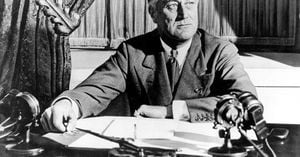On March 1, 2025, President Donald Trump signed an executive order declaring English as the official language of the United States. This significant move has stirred debate across the nation, as many question the implications of such a designation in a country known for its rich linguistic diversity.
The executive order states, "A nationally designated language is at the core of a unified and cohesive society, and the United States is strengthened by a citizenry that can freely exchange ideas in one shared language." This statement reflects a desire for unity in a nation where over 350 languages are spoken, according to recent estimates.
While English has long been the primary language used in the U.S., it was never formally declared the official language until now. English's status as the modern-day lingua franca of the world highlights its importance in international diplomacy and business. It has replaced French as the dominant global language, making it increasingly essential for non-native speakers to learn. In fact, English is already the official language in 30 states across the country.
Despite the rationale behind the executive order, critics argue that this decision may alienate millions of Americans who speak languages other than English. According to the last census, approximately 67.8 million people in the U.S. use languages other than English in their homes. This statistic raises concerns about potential discrimination against non-English speakers and the possible erosion of linguistic diversity.
Supporters of the executive order, however, argue that it aims to foster unity rather than suppress diversity. They believe that by designating English as the official language, the government is not attempting to erase other languages but rather to facilitate smoother communication and documentation within the country. Trump emphasized that the order "recognizes and celebrates the long tradition of multilingual American citizens who have learned English and passed it to their children for generations to come."
Moreover, advocates contend that learning English can provide non-native speakers with better opportunities for integration and success in American society. The complexities of the English language, often regarded as one of the most challenging languages to learn due to its myriad rules and exceptions, may seem daunting. Yet, for those who wish to make the U.S. their home, acquiring proficiency in English can significantly ease their daily lives.
However, the order has sparked a broader conversation about language and identity in America. The U.S. has always prided itself on being a melting pot of cultures, and language is a crucial aspect of cultural identity. The fear that children of immigrant families might lose their native languages in favor of English is a legitimate concern. Yet, many experts argue that bilingualism can be maintained alongside English proficiency, as children exposed to multiple languages during their formative years often retain both.
As the nation grapples with this new policy, it is essential to recognize that language is not merely a tool for communication but also a vessel for culture and heritage. The executive order does not strip away the rights of individuals to learn and teach their native languages; rather, it aims to establish a common medium for communication in a diverse society.
In the face of globalization and increased immigration, the decision to declare English as the official language may be seen as a necessary step toward ensuring that all Americans can engage in public discourse. However, it also raises questions about how the U.S. can balance the need for a common language with the rich tapestry of cultures that exist within its borders.
Ultimately, the implications of this executive order will unfold over time. As the country continues to evolve and adapt to changing demographics, the challenge will be to foster an environment where English serves as a bridge, not a barrier, to understanding and cooperation among its citizens.
In conclusion, while the official designation of English may provide a framework for unity, it is crucial to remain vigilant in preserving the linguistic diversity that enriches American society. The future of language in the U.S. will depend on how well the nation can navigate the complexities of identity, culture, and communication.




